In just three years, Renata Hrecska-Kovacs has become one of the most dynamic voices in Hungary’s specialty coffee scene. A lawyer by education and a barista by passion, she has learned to balance precision and creativity across two professions that demand both focus and dedication.
At Waycup Coffee & Deli in Budapest, she works as a barista, trainer, and consultant, while also serving as Quality Manager at Awaken Coffee Roasting and Co-Founder of Cupping Club Hungary, a community that gathers coffee lovers to taste, learn, and share knowledge. Her impressive sensory skills have earned her multiple competition podiums, including 1st place in the 2025 Hungarian Cup Tasters Championship, 2nd in the 2023 Barista Championship, and two 3rd-place finishes in the Filter Coffee Championships.
What drives her is a quiet determination to keep learning and sharing knowledge. Whether picking roast profiles, mentoring new baristas, or leading tastings, Renata approaches each role with the same measured curiosity that defines both her legal work and her journey in coffee.
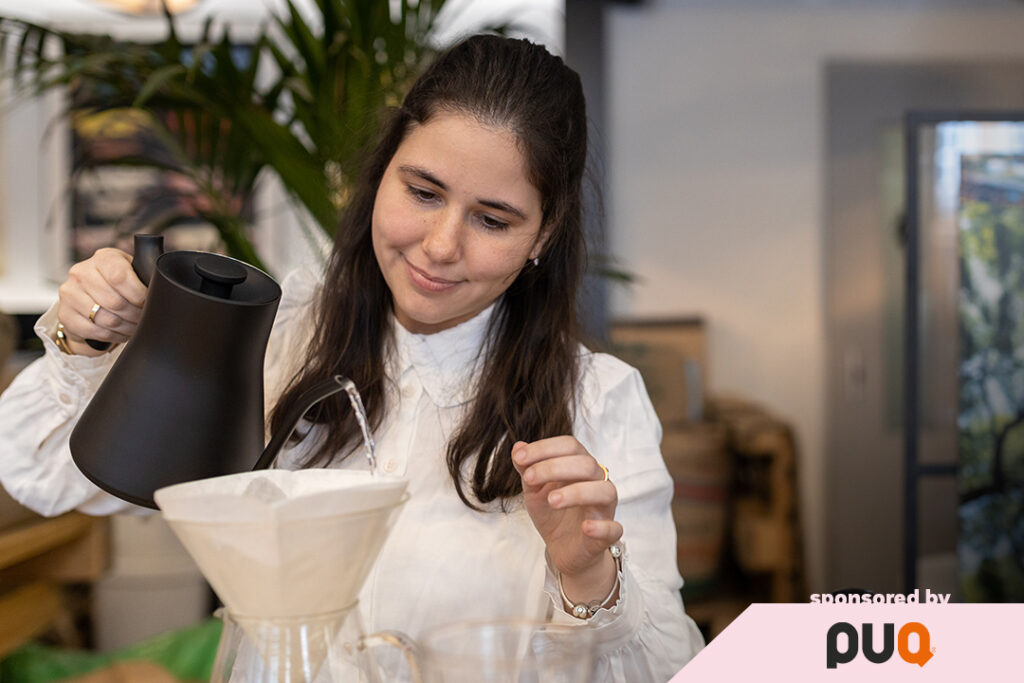
Renáta, what is your first memory with coffee?
My first coffee experience is connected to my beloved father, who always drank his coffee black with two sugars. I loved watching the crema settle into a little snail shape after stirring. And I loved the aroma of that classic, dark-roasted drink.
What inspired you to pursue a career in the coffee industry, and how did you get started? What did you do before coffee?
I work as a lawyer in my daily life, which requires a lot of concentration for me. After I started my first job, I needed a coffee to stay awake after lunch – that’s how it all started.
Sometimes I visited a café, sometimes I used the capsule machine at work. In any case, I noticed that coffees have different flavours. This interested me. I also noticed that I really liked coffees with a more acidic, citrusy flavour, which I found very rare, and I didn’t know why these flavours developed in them.
My husband saw that I was becoming curious about this area, so he surprised me with a six-week barista course. After defending my doctoral thesis, I started the course and found myself in a world that drew me in irresistibly.
I still do both of these things today: I’ve wanted to be a lawyer since I was little, but coffee touches a completely different part of my personality, which is also deeply important to me.
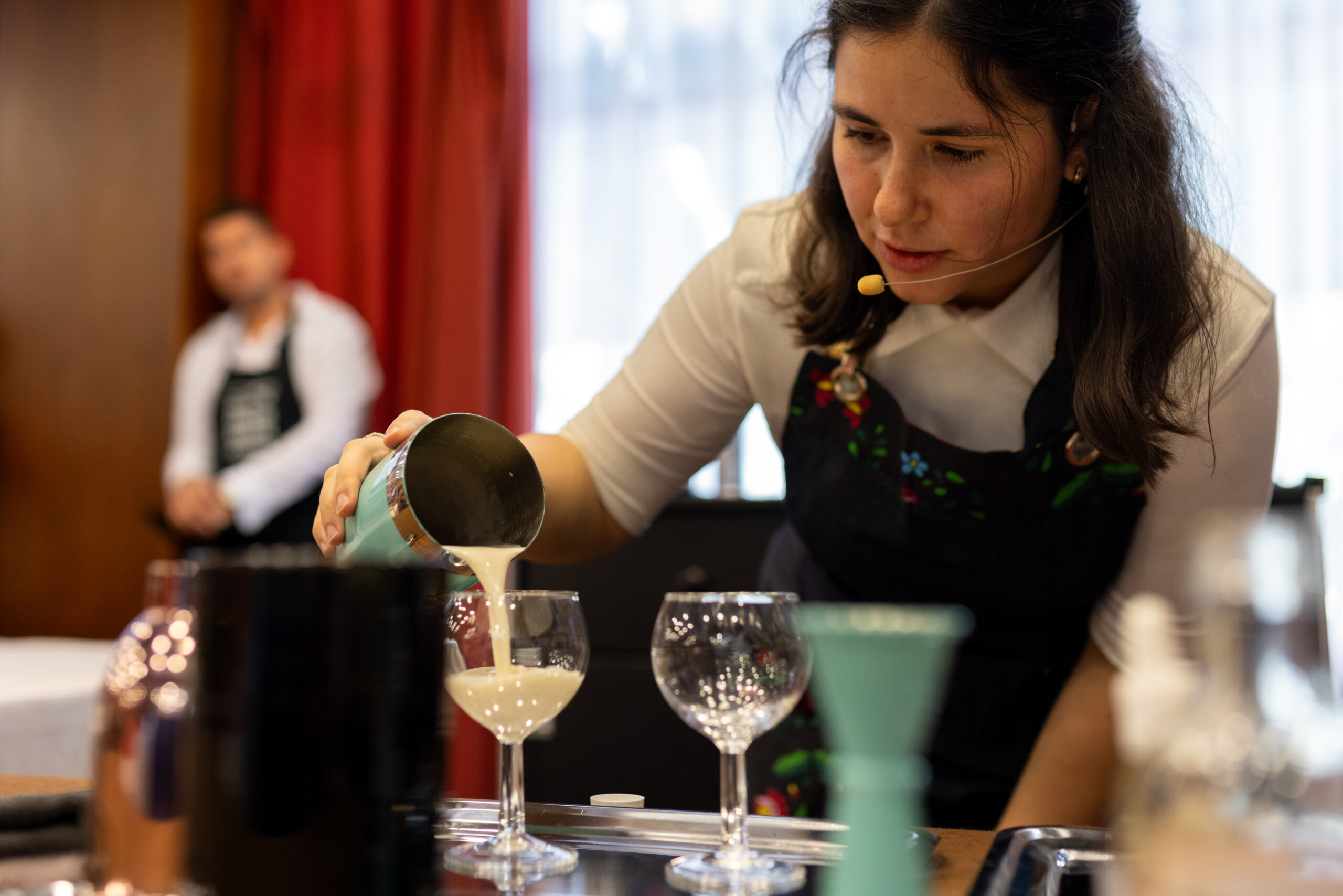
Tell us a bit about the places you work at. What are your roles?
I work as a barista in a small café called Waycup Coffee & Deli in Budapest, where we serve specialty coffees from Hungarian and foreign roasters to our guests. I am responsible for providing the professional background for the coffee, which means I select the items for the assortment, recommend recipes, and hold both internal and external training sessions.
As co-leader of Cupping Club Hungary, we hold monthly free coffee tastings for a community of more than 800 people, combined with an educational component. We are proud to have helped many people discover the multifaceted beauty of coffee and to have brought wonderful coffee rarities to our table.
As a quality manager at Awaken Coffee Roasting, I help a roasting company select the coffees to be offered, make suggestions for refining profiles, and monitor consistency.
What kind of experience do you want your customers to have when they visit you at the cafe?
I want guests to experience, without pressure and with sincere openness, that there is always something new to discover in the world of coffee. At the same time, I want them to feel comfortable with their choice of coffee drink at any given moment.
I would also be delighted if coffee were not just a drink for our guests, but a feeling that they are seeking: an uplifting force when they need energy and a soothing warmth when they want to relax.
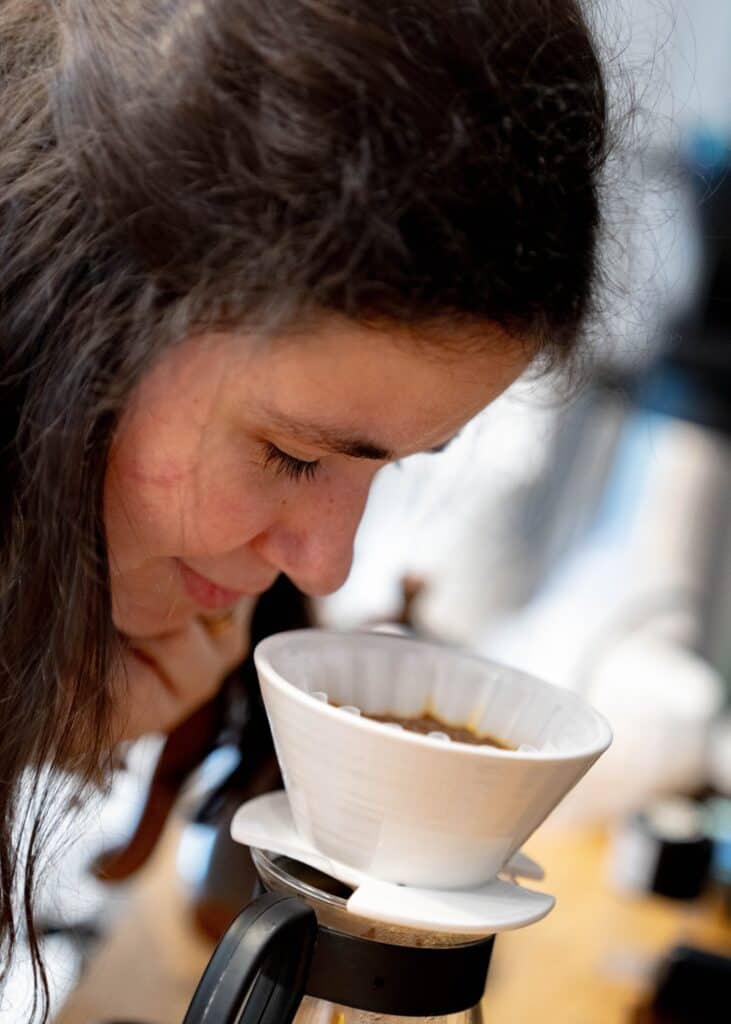
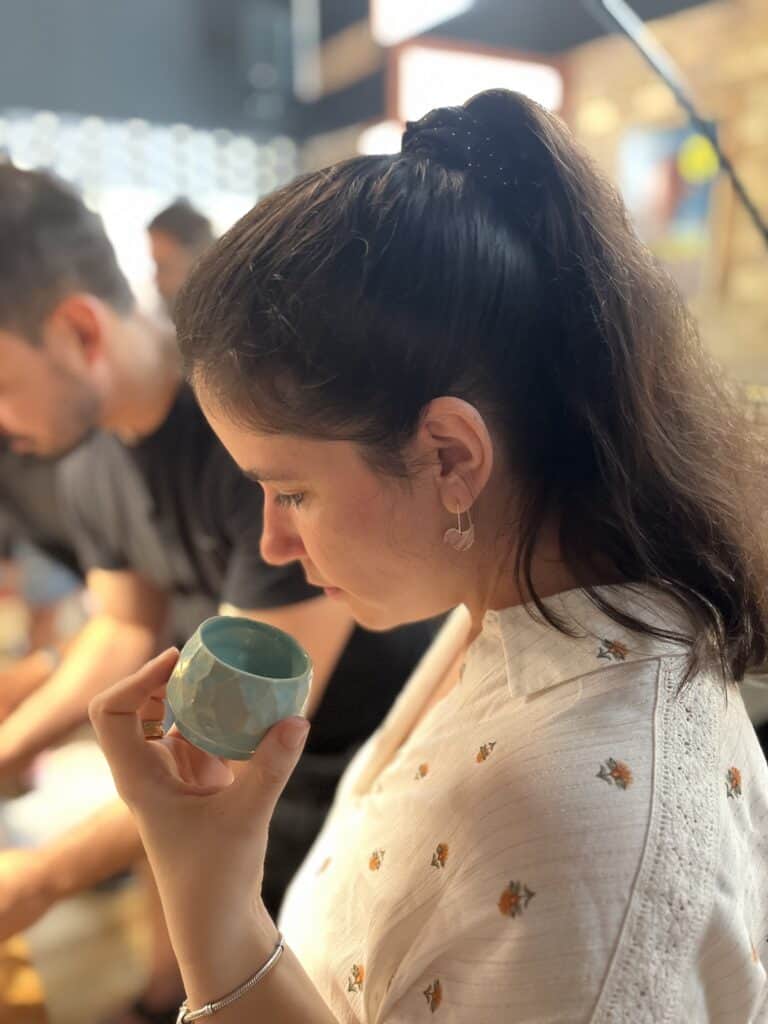
What is your favourite part of the day in your cafe, and why?
Getting ready in the morning: when I turn on the coffee machine and the counter comes to life. The smell of the first grind, the excitement of setting up the coffee, the clumsy bitterness of the first sips. If I’m lucky and everything goes well, I still have time to sit down and quietly drink my morning coffee before opening. This can bring me a lingering sense of peace for the whole day.
How do you stay motivated and inspired to keep improving your coffee-making skills?
I feel very blessed in my life because, at the beginning of my coffee career, I received training that gave me a perpetual source of interest in coffee. Then, after a while, coffee itself began to teach me: day after day, this plant makes it clear how much there is for us to discover. It is motivating in itself that every experiment I haven’t done and every coffee I haven’t tasted makes me feel like I’m missing out on something great.
Coffee is a path of continuous development, and for me, that makes this world extremely exciting. Of course, I also consider it very important that almost every known idea or rule related to coffee can be tried out immediately, giving us instant confirmation of whether our thinking is correct or our technique is good. This constant feedback is a fundamental resource for both my motivation and my development efforts.
Over the past three years, not a single day has gone by without me dealing with coffee in some way.
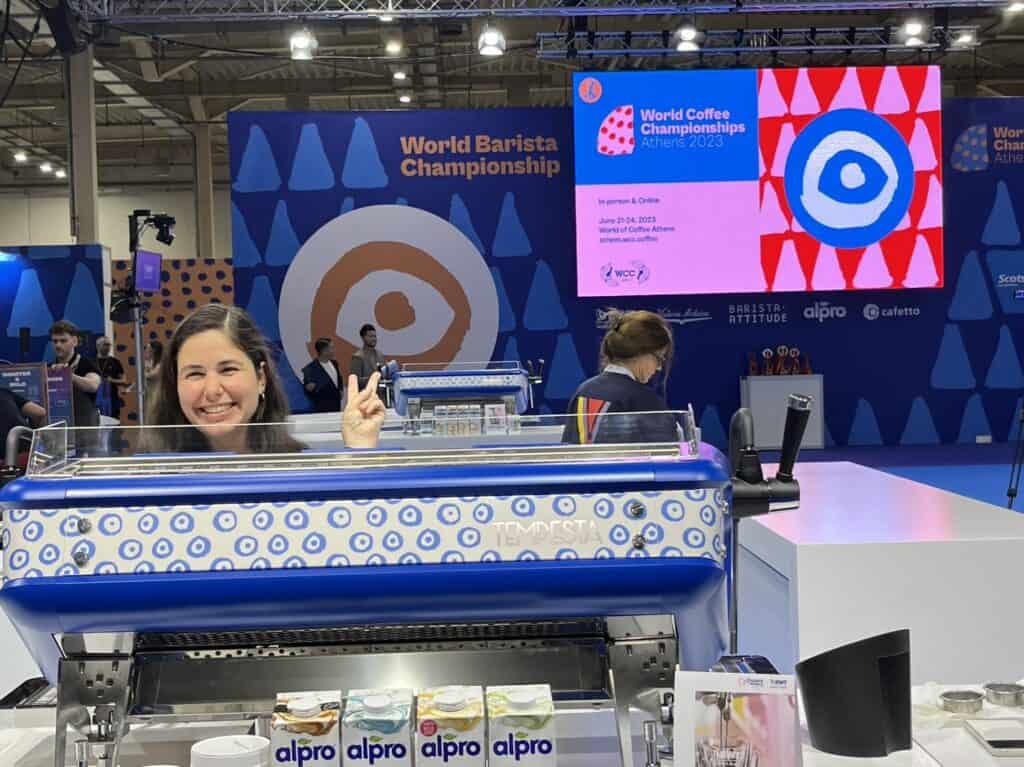
What are some common misconceptions about our industry that you’ve encountered, and how do you address them?
One such misconception is that specialty certification is just a gimmick, serving the purpose of selling already expensive coffee at even higher prices. I think it is important to educate people about the different quality levels of coffee, as this enables them to make informed decisions about what they actually want to drink when standing in front of the shelves. I try to achieve this goal also in the café, but the Cupping Club Hungary is one of the best places to continue such discussions.
Another common misconception here is that baristas are trained workers who don’t have any special skills and also don’t even need them, because coffee is just coffee, and it’s good no matter how you make it. Some people see baristas as that part of the staff who don’t even really have to deal with customers behind the coffee machine, so it’s sometimes pretty much the bottom of the hospitality ladder. Here again, the importance of education cannot be overemphasised: if guests treat coffee and the barista who prepares it well with respect and appreciation, this has an overall positive effect on strengthening the profession.
If this were to succeed in the long term, then perhaps working in a café would not only be a way for university students to supplement their income, but the whole thing could finally be about the art of coffee.
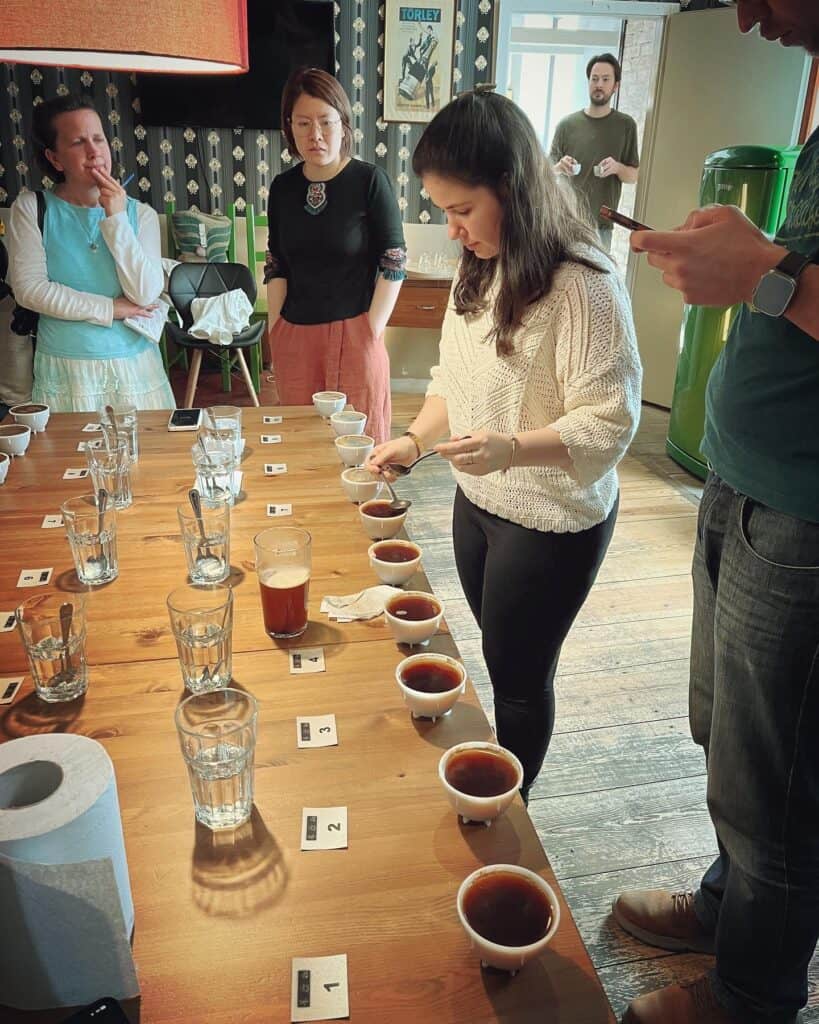
What are the current trends in cafes in your region? Are there any trends you promote yourself and would like to see more often in other places?
I see many variables in coffee trends at the moment. Co-fermented coffees have been particularly popular over the past year or two, which is linked to the phenomenon of more and more people wanting to enjoy a high-quality coffee experience in the comfort of their own homes. Co-fermentation offers an excellent opportunity for people to discover the flavours indicated on the packaging for themselves and enjoy a sense of accomplishment during the preparation process.
However, it seems true to me that each trend wave is followed by its exact opposite: recently, the search for intense flavours seems to be receding, and the washed process with a cleaner cup profile is coming to the fore.
Of course, we can also talk about trends in terms of what cafés offer: espresso orange has been a big hit this year, but cold brew, espresso tonic, and cold brew tonic continue to reign supreme. In addition, I have noticed that customers are becoming more open to specialty coffee capsules, as their quality improves year after year.
I myself don’t necessarily like to participate in trends. Instead, I try to encourage consumers to develop stable coffee evaluation and preparation habits, into which they can then incorporate current trends in such a way that they merely add colour to the coffee’s own reality rather than defining it.
You have some amazing achievements in championships. Can you tell us more about them? What are the next championships you’d like to compete in?
For me, competition represents a kind of peak performance in any profession, which is why it is an endless honor for me to be able to compete in coffee competitions.
These occasions provide an excellent opportunity to delve deeper into a particular area and to train against our weaknesses. That is why I believe that we will definitely win a competition if we improve our skills through it. In that case, we are competing against ourselves. What we achieve against our competitors is another question, but for me, that is not what determines the value of a competition.
I have competed in about fifteen competitions over the past three years in almost every traditional category. Each one has remained a great memory for me, and in addition to learning a lot about coffee, I have also met many wonderful people. And this is another aspect worth mentioning: competitions create a whole community filled with such positive energy that it is simply great to be a part of.
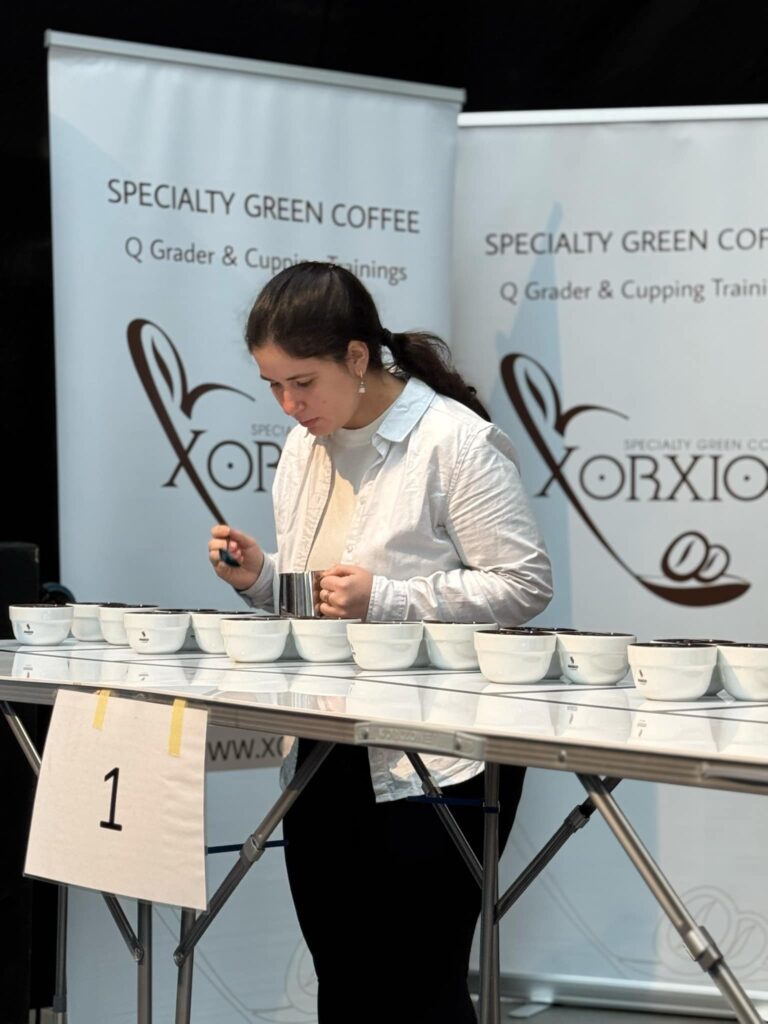
What are the next championships you’d like to compete in?
If I get the chance, I would love to compete in a Cezve/Ibrik championship and later perhaps a roasting championship. I am also interested in alternative competitions, such as moka pot competitions and the Leva Contest.
How did it feel to volunteer at the World Coffee Championships?
Unfortunately, Hungary is currently not a member of the Specialty Coffee Association, so the WCC is not available to us. However, I have been to every European World of Coffee since 2022 and volunteered at the world championships so that I could experience the big moments from the sidelines, at least a little bit.
It’s an incredible feeling to meet world-class professionals from whom I can learn a lot just by watching their routines up close. And when I talk to them or even help them, the experience stays with me for a long time, inspiring me to develop my own techniques.
What, in your opinion, is the most important thing to have in mind when you start to compete in coffee championships?
You’re not going for first place, but you have to believe that you can finish in first place.
This means that you need to be confident in yourself, your coffee, your recipe, and your technique so that uncertainty does not sabotage your results. At the same time, there are luck factors in who finishes in which place, so your own assessment of yourself can only be partially determined by the points and rankings you receive in the competition.
If you know that you have professionally done your best on a given day, then you have to move on, whatever your result. Even if you were successful, and even if you didn’t get the medal.
On top of all this, there is one more thing: if you are afraid or very nervous, it means that coffee is important to you. Appreciate this feeling, don’t turn inward because of it. If you are afraid, go ahead anyway and use that fear to be happy that you are trying something in an area that is so valuable to you.
If there were one piece of knowledge about coffee you’d like everyone to know, what would that be?
The flavor notes listed on the packaging are based on observations made typically by a particular farmer, green coffee trader, or roaster at a specific point in time. They are more suitable for giving us an idea of the flavour profile, but we should not let it spoil the experience if we do not find the drink to be as described on the label.
What are your passions and hobbies apart from coffee?
For me, coffee is my passion, and apart from that, my legal profession fills most of my schedule. However, I also love spending time with my family and creating as many happy memories with them as possible.
Where in Budapest do you find your best inspiration?
One of Budapest’s most wonderful spots is Normafa: here I can be very close to nature, yet still feel like I’m part of the city. I especially love coming here in the fall, when the forest leaves shine in a thousand colours. With a hot chocolate in my hand, I take a long, beautiful walk with my husband and our dog.
What coffee challenges are you looking forward to? Any new projects or collaborations?
I am currently waiting for the next competition opportunity and I am always open to cooperation. (I have previously had short-term, one-off collaborations with Slayer, Sibarist, Varia, and Cupping Club Hungary is in ongoing collaboration with Timemore and DiFluid.) As for the future, I would be happy to participate in testing processes, in the hope that my observations and experiments could contribute to the creation of something new and innovative.

Quick Fire Questions for Renata Hrecska-Kovacs:
Filter coffee or espresso-based?
Espresso.
Milk coffee or black coffee?
Black.
The most underrated coffee drink?
Americano and Long Black.
The most underrated coffee brewer?
French Press
Favourite piece of barista equipment?
The espresso machine.
How do you make coffee at home?
Timemore Crystal Eye Dripper

